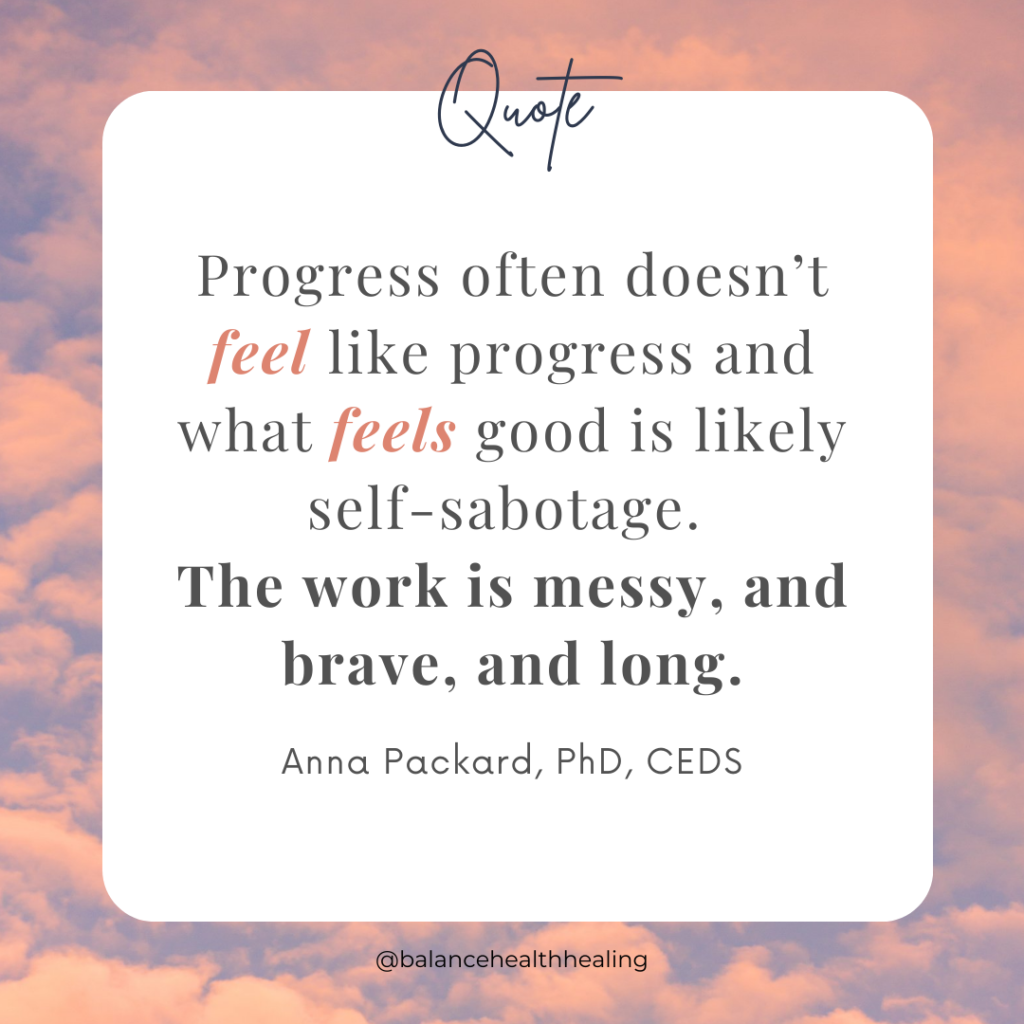Remember the sayings, “Rome wasn’t built in a day” and “anything worth doing, is worth doing well?” I know I, personally, haven’t heard these quotes in years…maybe even as far back as my prepubescent days.
 More and more I feel surrounded by a culture that values big progress and instant solutions. The belief that radical transformation happens quickly taunts us in self-help books, podcasts, new medications, testimonials, and even therapeutic interventions. Hell, I want to try Ketamine too and see if a life-transforming “trip” awaits me.
More and more I feel surrounded by a culture that values big progress and instant solutions. The belief that radical transformation happens quickly taunts us in self-help books, podcasts, new medications, testimonials, and even therapeutic interventions. Hell, I want to try Ketamine too and see if a life-transforming “trip” awaits me.
We all love dramatic transformation. Why else did Eat Pray Love top the best seller market for years? If only we all had the luxury of abandoning our careers, families, and daily lives to go find ourselves in exotic, international locations.
But most of us have daily lives that claim us and it is within them that we do our work.
There is nothing sexy or glamorous about the changes that take place slowly, over years.
In fact, sometimes the glacial pace of hard change can feel demoralizing and depressing. Even writing about this topic feels lackluster.
One of the very first things I learned in graduate school came from my professor who was teaching us Psychotherapy Foundations. She said, “A lot of people think therapy is exciting and dramatic. People who have never been to therapy think only about the juicy secrets and trauma revealed in our confidential spaces. But the truth is: therapy is long, hard work.”
I have worked in settings that required short-term therapy models. I witnessed people change in limited time-frames. I don’t want to negate that work can happen in those spaces.
But, now I work in a place where I have the luxury of seeing clients long-term and the transformation I witness is so different. Instead of only journeying with clients for a short chapter of their life, I get to journey for a few chapters, maybe even an entire volume of their life series.
I have learned that beauty and sacredness are in the messy, painful, middle chapters. The courage required beyond big life choices. The courage to simply get up and face another day. The courage to hope. The courage to believe that change is even possible.
I have one client that I’ve been privileged to know for 11 years. Her demons have been big and her progress hard fought. Over the years I’ve known her, there haven’t been grandiose turning points or mind-blowing insights. There have been shifts, and pivots and advances, and retreats, and breaking points and coping and medication changes, and Boost, and loneliness, and dreams and hundreds of dollars spent on scales she will throw away a month later, and fear, and vulnerability, and bravery. While there was no singular transformation, the person she is today is unrecognizable to who I met 11 years ago. She has changed herself and her life in profound ways, slowly, over time. Even though her work isn’t done, she continues to show up. She continues to work.
been big and her progress hard fought. Over the years I’ve known her, there haven’t been grandiose turning points or mind-blowing insights. There have been shifts, and pivots and advances, and retreats, and breaking points and coping and medication changes, and Boost, and loneliness, and dreams and hundreds of dollars spent on scales she will throw away a month later, and fear, and vulnerability, and bravery. While there was no singular transformation, the person she is today is unrecognizable to who I met 11 years ago. She has changed herself and her life in profound ways, slowly, over time. Even though her work isn’t done, she continues to show up. She continues to work.
The journeys of each of my clients almost exactly mirror the one I just described. Recovery from an eating disorder is long hard work. There aren’t short cuts or easy fixes. One hurdle is passed, only to be confronted with another. Progress often doesn’t feel like progress and what feels good is likely self-sabotage. The work is messy, and brave, and long.
This isn’t just unique to people working to overcome eating disorders. What about the messy, long work that confronts each of us in our lives? While crises or trials propel big growth and movement; the long, hard, lonely work, devoid of drama and fanfare, is just as transformative, if not more so. I know I struggle to value these slower and messier parts of myself and my experience. I know I can even sometimes feel shame about what feels like a lack of progress or honest confrontation around overt avoidance. Simultaneously, the work I witness from my clients reminds me to be compassionate and brave. It also reminds me to be grateful for the messy, boring, hard chapters that are part of my larger, beautiful, rewarding life.

